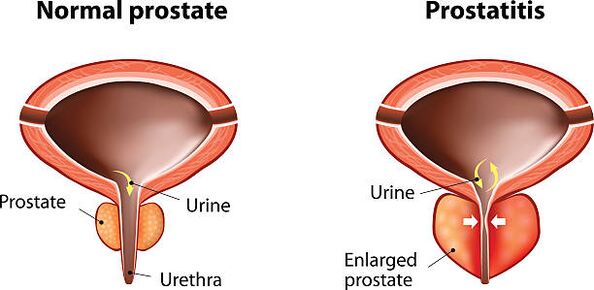Prostatitis is an inflammatory process that has developed in the glandular tissue of the prostate gland, sometimes with a transition to the muscular part of this organ. This causes perineal pain, weakness, fatigue, urinary dysfunction and sexual dysfunction. The definitive treatment of acute prostatitis is urgent to avoid dangerous complications of this disease.

Until now, both the cause and the process occurring in prostatitis are well understood. Therefore, urologists have an extensive arsenal of tools to treat this disease. The drug should be prescribed only by a specialist, who has knowledge of what relationship in the development of the disease a particular drug affects, and also takes into account contraindications to the drug.
Antibacterial agent
The most common cause of prostatitis is bacteria. Antibiotics are used to combat them.
To exert a targeted effect on the bacteria that cause prostatitis in a particular person, it is necessary to conduct bacteriological studies of secretions from the prostate gland. Only after knowing the name of the microorganism, its characteristics and to which antibacterial agent it is sensitive, can you choose a suitable antibiotic. And modern drugs tend to be similarly able to cure even severe forms of the disease. In acute bacterial prostatitis, the following antibiotics are used:
- Amoxicillin;
- Ceftriaxone;
- Cefotaxime;
- Ofloxacin;
- Ciprofloxacin;
- Azithromycin.
This is not a complete list of antibacterial drugs used in the treatment of prostatitis.
Antiviral treatment
If prostatitis is caused by herpes, it is treated with antiviral drugs. It:
- Acyclovir;
- Valciclovir;
- Ffamciclovir.
The latter is the "gold standard" for the treatment of viral prostatitis.
Non-steroidal anti-inflammatory drugs
Drugs such as Diclofenac, Indomethacin, Ketoprofen or Ketorolac are not so much needed to eliminate the pain that accompanies this disease, but to reduce the swelling of the gland and its inflammation. They also contribute to the appearance in the blood of substances that facilitate the manifestation of intoxication and the reduction of elevated body temperature.
The optimal drug against inflammation is Diclofenac, which also very well eliminates the pain syndrome. If the pain is particularly severe and sharp, Ketorolac is used.
Drugs that eliminate spasms
In the treatment of prostatitis, drugs are used to act on various key points of the pelvic and prostate spasms. This allows you to improve urination and helps drugs of the previous group eliminate pain. So here they apply:
- Drotaverine: it acts on smooth muscle, making it impossible for that reaction to occur, so muscle spasms occur;
- Baclofen: reduces the sensitivity of nerve fibers from the prostate and venomous organs;
- Tamsulosin: only works on receptors found in the bladder and prostate muscles.
Auxiliary drugs
A good addition to the treatment of prostatitis are the following drugs:
- Prostate extract: the drug protects prostate cells from damage during inflammation, improves microcirculation, eliminates blockages in the vessels of the small pelvis and strengthens the vessels. All of these effects are extremely beneficial for chronic prostatitis. Animal origin, no chemical origin, no side effects. It can be used as an injection or a suppository.
- Extracted from palm fruit. It is an herbal remedy with powerful anti-inflammatory effects. It also regulates the volume and force of urination, and reduces the uncomfortable symptoms that occur with defecation.
- Biologically active food supplement, containing a complex of proteins and nucleoproteins isolated from the prostate gland of cattle, affects the metabolism of the prostate gland, normalizes its work and, therefore, urinate.


























